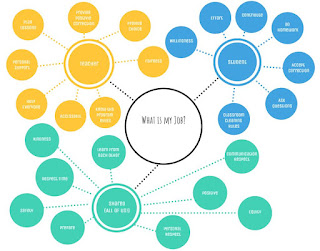TESL 0170 Lesson Plan 1 - Needs Assessment
This week I not only completed the observation part of my practicum, I began the teaching portion. The mentor teacher suggested that due to the classes being three hours in length, that the conclusion to the observation and the beginning of the teaching portions could be done in the same class. She also suggested that I develop and conduct a needs assessment plan rather than a teaching plan, which was a surprising idea to me but so worth the effort that it has taken to accomplish that. Not only did I explore those skills for an application in my practicum, but then I also transferred that to my workplace where I created a needs assessment to reinforce those skills in daily practice.
I have always known somehow that the best laid plans can easily be waylaid when teaching and my first time teaching was a great example of that. I had my needs assessment lesson plan ready, and the tasks that I wanted to accomplish, along with extra activities in case we moved through things more quickly than I anticipated. Then class started, and the first comment that was made by a learner was "this is weird!" Before we even started the lesson I had planned, my plan was derailed but it was so important to discuss that comment. In part, the reason why things felt weird is because I work with the learners in a shared workplace. In order that we address "the elephant in the room" as the teacher later commented, we needed to talk about why this was weird and how we were going to move from a place of awkwardness toward comfort with each other. Ultimately, I need them to engage with me in order to teach and this ended up being a great starting point for discussion. One of my goals for the class was that the learners would not be afraid to engage with me on a new level than what we are all used to, and it was gratifying to openly discuss this. Eventually we did navigate to the lesson and we even got most of the activities done that I planned - some were modified from the original intent in terms of time, but we certainly did not get to the extra activities! How is that for "real life" in the classroom? One of the best outcomes for me was the support of the mentor teacher regarding working through the altered beginning to the class. It gives me more confidence going forward that it is permissible to stray from the intended plan when it makes sense to do so.
As I was deciding how to share the information from this first teaching experience, I read one of the blog posts that I wrote about assessment in the earliest part of my TESL journey. You can find that post here: Assessing my Assessing. There is a great cartoon referenced at the end of the post that I thought about as I prepared the needs assessment for the class. Sometimes it is good to look at your previous work in order to learn from yourself. I tried to keep these ideas in mind when I planned the assessment and I reached out for feedback on my plan and one of the assessments I developed. Again, the feedback was useful and I made some changes prior to the class.
Here are the resources that I developed for that first class with a focus on needs assessment:
Lesson 1 - Needs Assessment Plan
South Central Post - October 22, 2020
Digital Literacy Needs Assessment
I have yet to review the written assessments that were completed by the students, but will do so soon in order to plan for next weeks' lesson. In the meantime the mentor teacher and I were able to debrief how things went the first time I was at the front of the class. Overall it went well, though I do know that I was nervous and moved a bit quickly to start. By midway, I was more relaxed, the students were participating, and I was pleased with the developing rapport. I believe that going forward some of my main challenges will be that I will need to be intentional about incorporating grammar into the class, and managing error correction as part of the ongoing nature of the class. While I do ask learners to clarify and correct shared understanding, and am able to ask questions that lead to re-framing or clarification , I am not always sure about direct correction. The mentor teacher does a great job of incorporating grammar into the lesson - she anticipates where difficulty will be and is prepared, or takes opportunity to address a specific need as it arises. In this way she often incorporates grammar, pronunciation, and error correction all into one process. This is part of the ongoing development that I hope to see personally in the teaching portion of the practicum.
Next up... lesson planning for next week!

Comments
Post a Comment